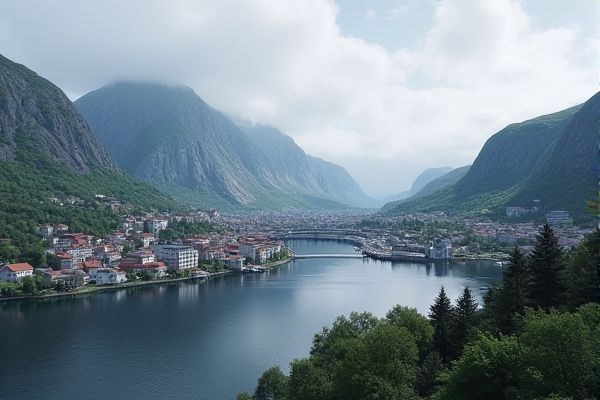
Insights from Norway residents and expatriate communities: High cost of living. Universal healthcare access. Stunning natural landscapes. Excellent public transportation. Long, cold winters. Emphasis on work-life balance. Extensive welfare benefits. Strong emphasis on equality. Learning Norwegian beneficial. Diverse outdoor activities available.
High cost of living.
The cost of living in Norway is extremely high, with typical city rents starting at around $1200 for a tiny studio apartment and expenses for dining out, public transportation, and car maintenance adding to the financial burden. Despite these high costs, the elevated wages can offset the expenses for those who are employed. According to Ashley Abroad, the financial strain is evident as Norway stands as one of the most expensive countries globally, with estimated annual expenses reaching Rs11,00,000. Consequently, the significant costs for accommodation, food, and transportation are unavoidable realities for residents and newcomers alike.
Universal healthcare access.
Norway's healthcare system provides universal health coverage, funded by general taxes and payroll contributions, ensuring automatic enrollment for all residents. The system covers primary, ambulatory, mental health, and hospital care, with patients making copayments and having access to free or subsidized services for certain conditions. Expatriates can access the same services as citizens through the National Insurance Scheme.
Stunning natural landscapes.
Norway is renowned for its stunning natural landscapes, including deep fjords like Geirangerfjord and Sognefjord, the majestic mountains of Jotunheimen National Park, and unique formations like Preikestolen and Trolltunga, which attract both locals and expatriates for hiking, skiing, and other outdoor activities. These breathtaking sites are so captivating that they are often featured in travel guides like those on TripSpi, which highlight the country's allure for adventure enthusiasts. Whether you're a fan of tranquil fjords or challenging mountain treks, Norway offers something for every nature lover.
Excellent public transportation.
Norway's public transportation system is highly praised by residents and expatriates for its efficiency, schedule, and safety. The system includes an extensive network of buses, trains, and water transport, with integrated ticketing systems like Ruter in Oslo, making it easy and convenient to get around. For more details on navigating the country by bus, you can visit the VisitNorway website. Although it is noted to be quite costly compared to other European countries, the seamless connectivity remains a significant advantage for travelers and commuters alike.
Long, cold winters.
Norwegian winters are cold and snowy, akin to those experienced in Massachusetts, yet expats like Ashley find them both manageable and enjoyable, particularly with the presence of snow and the mesmerizing Northern Lights. Although the limited sunlight in northern regions can be challenging, many expatriates in Norway have adapted to the brutally cold and dark Nordic winters by embracing winter activities and cozy indoor traditions. These include skiing, building igloos, and savoring warm beverages by the fireplace. For more insights on how expats are adapting to life in Norway, visit The Filipino Expat website. Such practices not only make the winters bearable but also allow them to embrace the unique Norwegian winter lifestyle fully.
Emphasis on work-life balance.
Norway is renowned for its strong emphasis on work-life balance, characterized by generous parental leave policies, shorter working hours, and ample annual leave. The culture promotes flexibility, egalitarianism, and teamwork, with many employers offering flexi-time and the option to work from home, which is highly appreciated by both residents and expatriates. For more insights into how these practices benefit the Norwegian population, you can explore the Benefits of Work-Life Balance in Norway to understand the positive impact on productivity and personal well-being.
Extensive welfare benefits.
Norway's welfare system, administered by NAV, provides extensive benefits such as unemployment benefits, parental benefits, pensions, healthcare, and social security. The eligibility for these benefits is often tied to residence and employment requirements. Importantly, the system includes provisions for both Norwegian residents and expatriates through international social security agreements. For further details about how these benefits are structured and accessed, visit the Oslo Kommune website.
Strong emphasis on equality.
Norway places a strong emphasis on equality, particularly gender equality, as evidenced by the Equality and Anti-Discrimination Act, which requires employers with 50 or more employees to report biannually on their progress toward achieving gender pay equity and gender equality, including detailed analyses of pay gaps and measures to address them. This commitment to equality is a cornerstone of Norwegian society, reflecting the country's broader social and economic model that prioritizes social cohesion, labor force participation, and extensive welfare benefits.
Learning Norwegian beneficial.
Learning Norwegian is crucial for integration and social settings in Norway, enabling residents and expatriates to understand the culture, engage in conversations, follow local media, and navigate everyday life more effectively, which is especially important for finding jobs and applying for permanent residence. To delve deeper into this topic, the website Oslo Kommune provides valuable insights on the importance of mastering the Norwegian language, highlighting its role in a successful and fulfilling life in Norway.
Diverse outdoor activities available.
Norway offers a diverse range of outdoor activities, including skiing, kayaking, whale watching, dog sledding, hiking, and more, allowing residents and visitors to deeply connect with the country's natural wonders such as mountains, fjords, and the Northern Lights. Many Norwegians have a strong affinity for nature, with over half having access to cabins in the woods where they can engage in various outdoor pursuits during weekends and holidays. To explore more about these exciting outdoor experiences, visit their Hurtigruten website.
